Reviews
Andrew Davis
USA, 1992
Credits
Review by Rumsey Taylor
Posted on 11 July 2009
Source iTunes rental
Categories Favorites: The Action Movie
Steven Seagal’s very essence is more than adequately summated on the cover of nearly any one of his films: his hair pulled stringently into a ponytail, his lips pursed in determination, his eyes - relaying such poise and capability - scanning and considering your vulnerabilities. This is the integral image of Steven Seagal. Put him in any violent circumstance, in any context, anywhere in the world, and this image persists, a statue of permanent stoicness.
And then there’s the voice: at first you barely notice it, because it doesn’t register with the same turgid authority as any other action star’s. It comes out at a pitch just higher than a whisper, like he’s constantly telling you secrets. This draws you in, endearing you to Seagal’s inward gentleness, betraying the façade of stoic masculinity iterated on the posters throughout his concentrated career.
Seagal had made four films prior to 1992’s Under Siege, each a modestly budgeted film that reaped considerable profits. At this time he had waged combat against an impressive array of villains, earned the sympathy of beautiful women, and demonstrated an impressive knowledge of ballistics, politicized monologues, and most especially martial arts. None of this variety matters, because Seagal is the sort of star for whom variety is an impairment. The women or villains or weapons may change in each of his films, but you watch them because of him, because of his regulated, unemotional approach to any conceivable situation of doom.
Under Siege is the first film to violate this consistency. Because of this, it’s not considered his best film among Seagal purists (namely the inimitable Vern1), but it is arguably the biggest, and certainly his most popular. It grossed a hundred-and-fifty million in 1992—despite this, Under Siege failed to make permanent Seagal’s unique, if limited charisma.
In retrospect it’s of little debate as to why Seagal isn’t as reliable a masthead star as Schwarzenegger, Gibson, or Stallone. He’s nowhere near as viscerally embellished as his action movie peers, for one, his muscles cloaked behind a typically black ensemble (or in this film, in a chef’s uniform). The most popular action stars are never understated, and Seagal is all understatement. But this is precisely what’s most appealing about him—his responses are never excited, his demeanor never frantic. He is always calm within situations that would elicit panic in any other action star. By design he’s an irregular constant within the utterly formulaic action genre—he doesn’t appropriately suit the role; the role suits him. In Under Siege, he’s a cook because, later in the film, he must dispense with terrorists with a butcher knife, or cook an explosive concoction in a microwave (and time it so that it erupts at precisely the instant when the terrorists pass in front of it). He’s an ex-Navy SEAL because, by the end, he must instruct a makeshift team of soldiers on how to load missiles into a battleship turret. At no point in the entire film does he exhibit fear. With the exception of a rather ghastly cheek scrape, he remains largely unscathed, as well.
Action movies are most effective when they craft believable risk, and few of them do this. Seagal’s movies, contrarily, vest no interest in staging convincing scenarios of risk, but they effortlessly fulfill one of the action movie’s narrative conceits: absolute authority. Typically at any point in an action movie, there’s a character who knows precisely what to do or when—Seagal epitomizes this characteristic. He possesses such an indefatigable, MacGuyverian authority that in the climactic confrontation between he and the primary terrorist (Tommy Lee Jones; he and Gary Busey make for a heedlessly entertaining pair of villains), he even verbally analyzes his nemesis’ motivations: “You and I: we’re the same,” he near-whispers. The terrorist is as rapt by his monologue as we are. In short order, his eye is gouged out with a thumb, his skull pierced by a butcher knife, and his face thrust into a computer monitor. Resolving the conflict in the most violent manner imaginable, Seagal’s face remains frozen in calm determination.
- Vern’s catalogue of Seagal’s movies, Seagalogy: A Study of the Ass-Kicking Films of Steven Seagal, is an essential text, not only on this career in particular but the action genre in general. ↩
More Favorites: The Action Movie
-

First Blood
1982 -

The General
1926 -

The Running Man
1987 -

Guns
1990 -
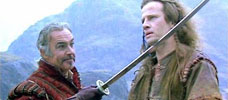
Highlander
1986 -
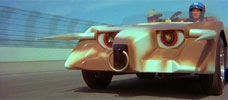
Death Race 2000
1975 -
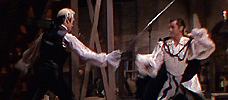
Scaramouche
1952 -

Do or Die
1991 -
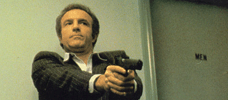
Thief
1981 -

Mission: Impossible
1996 -

Invasion U.S.A.
1985 -

Rambo: First Blood Part II
1985 -

Bullitt
1968 -

Hard Hunted
1992 -

The Fugitive
1993 -

Kindergarten Cop
1990 -
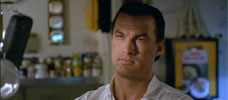
Under Siege
1992 -
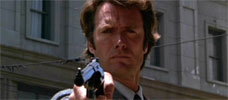
Dirty Harry
1971 -
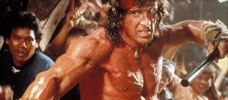
Rambo III
1988 -
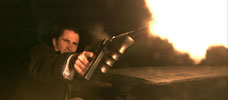
Public Enemies
2009 -

Day of the Warrior
1996 -

The Good, the Bad, the Weird
2008 -

Straw Dogs
1971 -

Die Hard
1988 -

Con Air
1997 -

Collateral Damage
2002 -
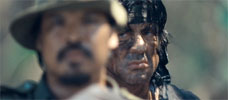
Rambo
2008
We don’t do comments anymore, but you may contact us here or find us on Twitter or Facebook.



